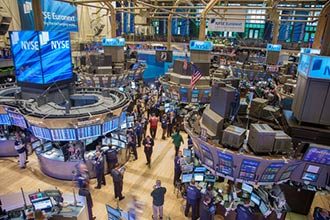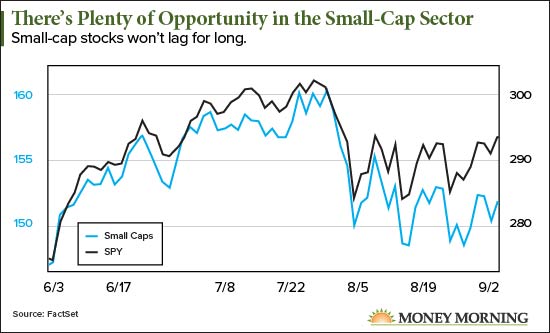It looks like life may be about to imitate art. Michael Burry, the investor who shorted mortgage securities ahead of the 2008 housing meltdown and was chronicled in the movie, "The Big Short," sees another gigantic problem ahead.
In fact, he thinks it could cost investors a bundle if they're not careful.
 You see, Burry says we're in a passive investing bubble. Passive investing - buying index funds instead of stocks or actively managed funds - has a large-cap stock bias. Most indexes are capitalization weighted. The bigger the stock, the more the indexes rely on it.
You see, Burry says we're in a passive investing bubble. Passive investing - buying index funds instead of stocks or actively managed funds - has a large-cap stock bias. Most indexes are capitalization weighted. The bigger the stock, the more the indexes rely on it.
Think about it. Only two stocks, Microsoft Inc. (NASDAQ: MSFT) and Apple Inc. (NASDAQ: AAPL), make up a whopping 36.6% of the weight of the SPDR Information Technology Sector ETF (NYSEArca: XLK). And there are 70 stocks in the index!
Put another way, small-cap tech stocks have very little influence. Juniper Networks Inc. (NASDAQ: JNPR) makes up 0.15% of the XLK ETF.
Since so much money is invested in index funds that track the S&P 500 and other large-cap indexes, Juniper and hundreds of other stocks are not even considered at all by passive investors.
Watch Now: Robert Herjavec is helping everyday Americans discover the next Airbnb. Click here now...
But here's the problem. Because ETFs have to buy more of these larger companies, they're jacking up the prices for these stocks. And the more those prices rise, the more the ETFs have to buy. That's creating an unsustainable trend in large-cap stocks, according to Burry.
But that's an opportunity for investors to buy some of the best companies in the world at bargain prices...
When Everyone Thinks the Same Thing, Bad Things Can Happen
We here at Money Morning have long warned about the passive investing approach.
When you track the market, such as buying an S&P 500 index fund, you cannot beat the market. And thanks to embedded fees, you actually will lag the market by small amounts each year. And year after year, those fees really add up.
But passive investing doesn't just hurt you by lagging the market. Try selling your passive holdings when the market inevitably hits a rough patch. We don't mean a garden variety correction but rather a time when investors head for the exit doors in a stampede.
We see this sort of panic over and over. The market can only absorb so much selling at any given time. So when something hits the market, such as the Lehman Brother collapse, stock prices plunge in short order due to the huge selling pressures.
Just look at the 2010 Flash Crash. Some ETFs became unhinged from their underlying indexes and were priced at pennies on the dollar.
And another flash crash in August 2015, sparked by the perception that liquidity had dried up, saw the Dow Jones plummet 1089 points, or 6.6%, right after the open.
Investors in large-cap index funds were stuck. Billions of dollars were trying to flee the large-cap Dow at the same time.
But there's opportunity here too.
Burry says small-cap stocks are still undervalued despite the record long bull market, and they could be the biggest winners when this bubble pops. After all, while the Dow is only about 4% below its all-time highs, the Russell 2000 is down about 7.5% from its 2019 high and about 14.5% from its all-time high set last year.
Take a look at this chart, and you can see small caps are lagging behind the performance of the largest ETF. It won't be long before small-cap stocks catch up.

And you can juice the potential gains even more by owning one of the best small-cap stocks on the planet.
In fact, this stock has a perfect Money Morning Stock VQScore™ of 4.9, which means it's primed to explode higher...
The Small Cap to Own Ahead of the ETF Bubble
[mmpazkzone name="in-story" network="9794" site="307044" id="137008" type="4"]
Small-cap stocks don't often have name recognition. But that doesn't mean they're not worth your time to investigate and find potential winners.
One potential winner is private banking and wealth management firm Boston Private Financial Holdings Inc. (NASDAQ: BPFH). This firm specializes in private banking and wealth management for high net worth clients.
This stock not only made our list of top 25 small-cap stocks to buy, but it has a perfect score in our proprietary stock rating algorithm.
Financial stocks as a group were hurt by the inverted yield curve because many make their money by borrowing at short-term interest rates and lending it back out at higher longer-term rates. If short-term rates are at or above long-term rates, then profits get squeezed.
But Boston Private Financial has proven resilient so far. The company's profits more than doubled between 2017 and 2018, coming in at a 10-year high of $81 million. Plus, the company has grown its income from interest for five years straight.
And now with the Federal Reserve expected to lower short-term rates at least once over the rest of this year, banking firms like Boston Private Financial should get a boost.
That makes right now an excellent time to enter a position in Boston Private Financial, especially considering it's priced attractively at $10.96 a share. That gives it a price/earnings ratio of just 9.65, less than half of the index's average of 20.53, according to MorningStar.
That means shares could double before catching up to its peers.
That's all on top of a 4.4% dividend yield, more than double the average you'd get from owning a passive investment like SPY.
America's Favorite Angel Investor Shows How Easy It Is for Anyone to Invest in Ground-Floor Startups
You've probably seen stories about this person or that person making an absolute fortune from some unknown startup suddenly becoming a household name... like Uber, Airbnb, SpaceX, or Bird.
Now, it's your turn.
Shark Tank's Robert Herjavec is showing how easy it is for anyone to turn as little as $50 into what can be life-changing windfalls... all from investing in startups.


